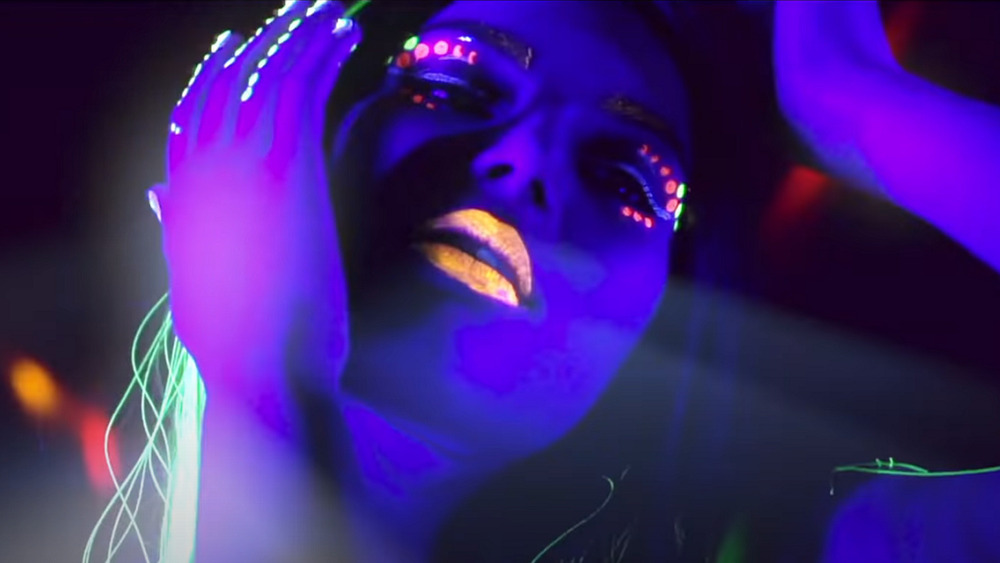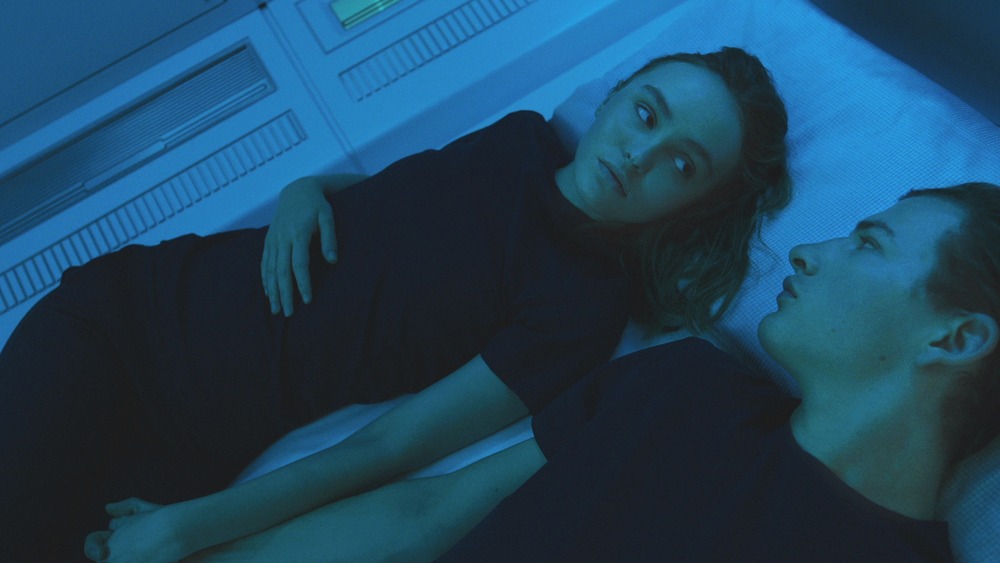Voyagers Review: An Imbalanced Morality Tale, In Space
Science fiction, as a genre, has the potential to highlight something indomitable and uplifting in its depiction of the human condition. By telling stories unbound to the weighty tethers of reality, it becomes possible to explore human beings against a broad backdrop, the vast canvas of endless possibility, and in that nebulous realm, reinforce the inherent goodness at the heart of all people. Sure, in film, sci-fi is generally split between blockbuster IP exploitation and the po-faced navel-gazing that comes from learning all the wrong lessons from Stanley Kubrick's 2001: A Space Odyssey. But that aspirational core is always there.
In a film like Neil Burger's Voyagers, pitched as a sort of Lord of the Flies in space, the director's ultimately inspiring message is sabotaged by his unfortunate, uncanny ability to capture the worst of humanity, even as his entire narrative apparatus is trying to remind the viewer of the opposite. It is a movie with a profound optimism baked into its premise that happens to do a little too good a job of building and presenting obstacles standing in the way of our evolution. So much so, in fact, that by the time the credits roll on its stirring and hopeful finale, it still pales in comparison to the unsettling baseness that comes before it.
Voyagers, like many similar works, is principally concerned with humans' exploration of the stars. Specifically, its launching point is a massive experiment to send a settlement of colonizers to an uninhabited planet to secure a future for our species beyond this dying planet we've already plundered to oblivion. But the journey is so long that the children being sent on the expedition won't ever reach their destination. It's a mission, ultimately, for their grandchildren.
But sending a giant spaceship full of pre-teens into the beyond is risky business. So Richard (Colin Farrell), the scientist and counselor in charge of training and raising these kids, offers a great sacrifice. He chooses to leave his life on Earth behind and follow his students into the stars, allowing the mission to begin a few years early and help guide them through this journey.
One actual adult on a spaceship full of teenagers who've never known life outside a hermetically sealed social experiment. What could possibly go wrong?
In space, no one can hear you go to horny jail...
Once some years have passed and the mission has begun in earnest, one would be forgiven for expecting Voyagers to contort itself to the accepted strictures of the young adult novel adaptation formula. Yes, the film is based on an original screenplay from Burger, but these days if a studio greenlights a movie with a bunch of pretty young people and a high concept, it's expected that film will fall into certain recognizable patterns.
But Voyagers leverages those expectations for its central conflict, presenting the petty dramas that make up most human interpersonal interactions as the primary hurdle halting progress.
For the most part, the crew works together seamlessly, like a military unit full of scientists, engineers and technicians, all answering to Richard, who is there for moral support and guidance as well as being the ship's chief officer. But Richard has taught his students a little too well, allowing them to perceive the outer edges of their world's walls. Namely, mysterious hidden compartments in the ship's blueprints purposely hidden from its current inhabitants (saved, specifically, for the third generation to come) and the haunting revelation that the blue drink that comes standard with their meals is drugging them and keeping them docile.
The three leading figures of the crew form a tortured kind of love triangle at the film's core, central to these discoveries. There's Sela (Lily-Rose Depp), the sensible and reserved medical officer Richard confides in as the only one of the kids he deems emotionally mature enough to treat as a friend. But on either side of her, there's Chris (Tye Sheridan) and Zac (Fionn Whitehead), two close friends whose dueling reactions to the news they're being quietly controlled by the program sets the film's primary conflict into motion.
The truth forces a schism between Chris and Richard, as the once loyal and unquestioning student begins to question the mission and his place within it. But Zac is the one more affected, on a disturbing and primal level. The drug in the blue drink suppresses revolutionary thought, muting the kids' ability to question authority, but it also works as chemical castration. In keeping a ship full of teenagers' respective libidos in check, it becomes considerably easier to keep them focused on the task at hand rather than the soap opera havoc their raging hormones might wreak on a less ponderous YA story's narrative.
So when Chris, Zac, and others start refusing to drink the blue, years of repressed emotions and urges come to the fore, fomenting conflict where there once was none. What starts as the kids electroshocking one another for a cheap rush quickly devolves into wonton lust seeping into every corridor of the ship. Before long, an untimely tragedy creates a power vacuum among the crew, just as conjecture about an alien presence on the ship thrusts the delicate experiment into catastrophic upheaval.
A little too convincing
The many references to William Golding's Lord of the Flies in the film's promotional material prove more than apt. In interviews explaining the inspiration behind the film, writer/director Burger has said that the image that bore this particular fruit in his mind was the idea of a rabid pack of youth hunting one of their own through the halls of a ship. True to form, as the shaky social bonds within the mission's structure begin to fracture, that haunting image comes to life.
But while that spark of imagination may suggest Voyagers is a stark and fatalist exercise, it's quite the opposite. Burger positions the main thrust of the story, the chaotic reign that arises out of the turmoil and division from the second act's startling revelations, as merely the temptation blocking humanity from prosperity, an irascible weakness we have always been strong enough to overcome, no matter the circumstances.
The problem is that Burger's execution of portraying humanity's weakness far exceeds his attempts at lionizing its strength.
The diverse cast of youths, featuring the aforementioned stars as well as figures like Chanté Adams, Quintessa Swindell, and Isaac Hempstead Wright, provide a ton of strong work, but none of the performances possess the raw energy of Whitehead's Zac, the film's lecherous antagonist. Whitehead, who many viewers may know from Dunkirk or the "Bandersnatch" episode of Black Mirror, delivers such a disturbing portrait of man's destructive id run amok that he singularly sells the idea that society is ultimately doomed to fail, regardless of circumstance or setting.
In Zac, Burger presents a haunting demagogue who transforms his own hubris and bitterness at being rejected by Sela into the kind of toxic charisma that turns cowards into surprisingly effective supervillains. As his "candy for breakfast" style platform, supplemented by Red Scare tactics and fear-mongering, give him control of the ship, none of the other cast members on the side of the angels provide a sufficiently compelling counterpoint to his madness.
But with Chris, Sheridan doubles down on the clean-cut boyishness that made him such a good Scott Summers in X-Men: Apocalypse, only with the added benefit of more experience and a better screenplay to work from. But he never once feels like a believable counterpoint to his former friends' antics. In fact, the best thing about his performance is the way he telegraphs the knowledge that deep down, he knows he's only nominally more honorable than Zac.
That leads Depp's Sela to pull up the rear, which she attempts to do with aplomb, but the character remains an underwritten and simplified figure in a story rife with complexity and nuance. Really, it's Farrell's work, turning in the softest, most sincere work of his career, that should set the balance. Amid the din of horned-up youngsters letting their loins make all the decisions, his reassuring father figure provides a great deal of needed gravitas to the proceedings.
But even once the allegorical conflict has been resolved and Burger rockets the timeline far enough in the future to offer a calming response to the film's many depressing questions, it feels too much like a saccharine and unearned conclusion. By the time that heartwarming closing note plays, the audience has been listening to a dark tune far too catchy to drown out with a ballad's half-time chorus.
Voyagers wants the viewer to believe humans will find a way off this planet and make right with a civilization do-over, despite all the evidence of reality — and the bulk of the film itself — to the contrary.


